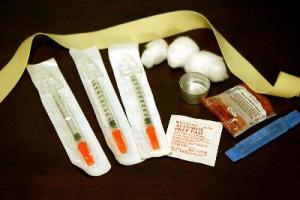Consequences of Prohibition
Drug War Issues
Politics & Advocacy
In a report released Tuesday, the New Jersey Department of Health and Senior Services has found that the state's needle exchange program has provided clean needles to nearly 10,000 drug users and gotten more than 2,000 of them into drug treatment. In the report, Health Commissioner Mary O'Dowd concluded that the program is a success and should be continued.

"Sterile syringe access programs (SAPs) which include drug treatment and behavioral interventions are one model proven to significantly prevent/reduce the transmission of these diseases," the report noted. "These programs have also been shown to facilitate enrollment of IDUs into drug rehabilitation programs."
New Jersey passed a pilot needle exchange law in 2006, and Atlantic City became the first in the state to implement a needle exchange the following year. Camden, Newark, and Paterson came on board in 2008, and Jersey City in 2009.
Those programs saw 9,912 people enrolled between November 2007 and November 2011. Nearly 300,000 clean needles were distributed, with more than 160,000 dirty ones collected. In 2010, the state began providing each program with a nurse, and since then 59 pregnant injection drug users have received prenatal care and drug treatment.
"We are totally thrilled and certainly very grateful to the commissioner for her support," said Roseanne Scotti, head of the Drug Policy Alliance New Jersey office, who faced off against lawmakers, law enforcement, and social conservatives to help push the bill through. "This is a culmination of a 20-year battle, when Senator Wynona Lipman introduced the bill back in 1992."
This work by StoptheDrugWar.org is licensed under Creative Commons Attribution-ShareAlike 4.0 International
Add new comment